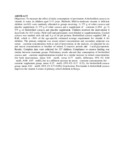Effect of Provitamin A-biofortified Cassava on Vitamin A Status of Kenyan Children: A Randomised Controlled Trial

View/
Date
2015-08-14Author
Talsma1, Elise F
Brouwer, Inge D
Verhoef, Hans
Mwangi4, Alice M
Boy, Erick
Maziya-Dixon, Busie B
Zimmermann, Michael B.
Melse-Boonstra, Alida
Language
enMetadata
Show full item recordAbstract
Objectives: To measure the effect of daily consumption of provitamin A-biofortified cassava on
vitamin A status in children aged 5-13 years.
Methods: Mild-to-moderate vitamin A deficient children (n=342) were randomly allocated to groups
receiving: 1) 375 g of white cassava and placebo supplement; 2) 375 g of white cassava and a
supplement of β-carotene (1,054 μg); 3) 375 g of biofortified cassava and placebo supplement.
Children received the intervention 6 days/week for 18.5 weeks. Field staff and participants were
blinded to supplementation. Cooked cassava was mashed with salt and 4 g of oil per portion.
Biofortified cassava supplied 208 μg RAE, which is ~50% of the age-specific estimated average requirement for vitamin A for children. The primary endpoint was serum retinol concentration and
secondary endpoint was serum β-carotene concentration, both at end of intervention; in the
analysis, we adjusted for sex and serum concentrations at baseline of retinol, C-reactive protein
and α1-acid-glycoprotein.
Results: Complete data were collected for 337 children. Compliance to cassava feeding was
similar between treatment groups. Preliminary results showed that consumption of biofortified
cassava and β-carotene supplementation resulted in a similar increase in retinol concentrations
(for both interventions, mean: 0.81 μmol/L versus 0.77 μmol/L; difference, 95% CI: 0.04 μmol/L,
0.00─0.07 μmol/L) but in a different increase in serum β-carotene concentration (for β-carotene
supplement group, mean: 0.25 μmol/L (95% CI: 0.17─0.33), for biofortified cassava group, mean:
0.81 μmol/L (95% CI: 0.73-0.88))
Conclusions: Provitamin A-biofortified cassava improves the vitamin A status of primary school
children in Kenya.
Citation
Talsma, E. F., Brouwer, I. D., Verhoef, H., Mwangi, A. M., Boy, E., Maziya-Dixon, B. B., ... & Melse-Boonstra, A. (2015). Effect of Provitamin A-biofortified Cassava on Vitamin A Status of Kenyan Children: A Randomised Controlled Trial. EJNFS, 5(5): 836-837,Publisher
University of Nairobi
